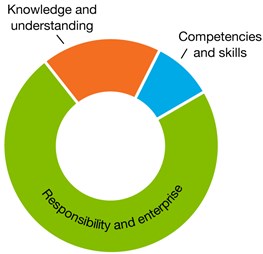Explore content
Understand computer mediated communications
understand that computer mediated communications have advantages and disadvantages in supporting active participation in a community of practice and the management of collaboration on digital materials
Identify the impacts of ICT in society
assess the impact of ICT in the workplace and in society, and speculate on its role in the future and how they can influence its use
Typically, by the end of Year 10, students:
Select and evaluate data and information
develop and use criteria systematically to evaluate the quality, suitability and credibility of located data or information and sources
Typically, by the end of Year 10, students:
Recognise intellectual property
identify and describe ethical dilemmas and consciously apply practices that protect intellectual property
Apply digital information security practices
use a range of strategies for securing and protecting information, assess the risks associated with online environments and establish appropriate security strategies and codes of conduct
Apply personal security protocols
independently apply appropriate strategies to protect rights, identity, privacy and emotional safety of others when using ICT, and discriminate between protocols suitable for different communication tools when collaborating with local and global communities
Define and plan information searches
select and use a range of ICT independently and collaboratively, analyse information to frame questions and plan search strategies or data generation
Locate, generate and access data and information
use advanced search tools and techniques or simulations and digital models to locate or generate precise data and information that supports the development of new understandings
Generate ideas, plans and processes
select and use ICT to articulate ideas and concepts, and plan the development of complex solutions
Generate solutions to challenges and learning area tasks
Design, modify and manage complex digital solutions, or multimodal creative outputs or data transformations for a range of audiences and purposes
Collaborate, share and exchange
select and use a range of ICT tools efficiently and safely to share and exchange information, and to collaboratively and purposefully construct knowledge


